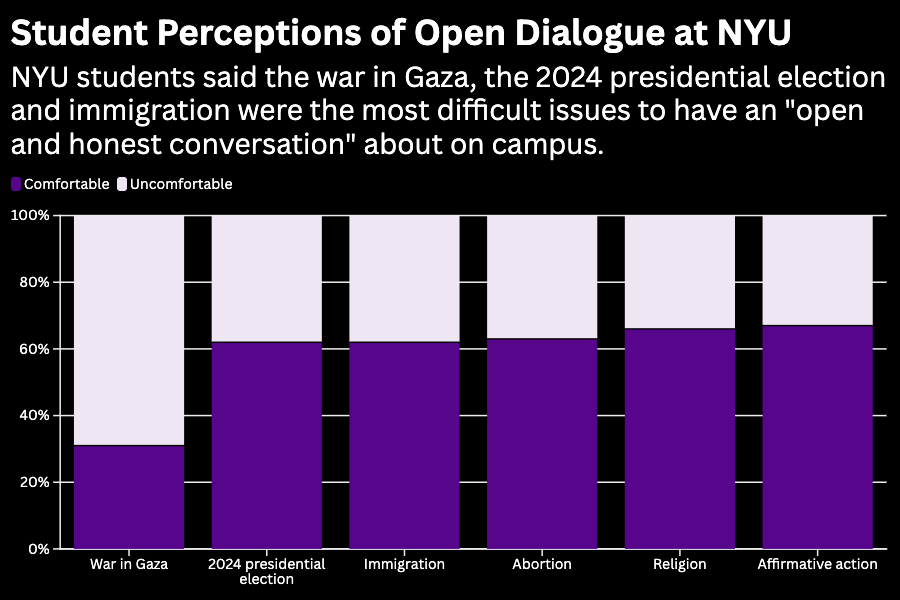NYU received an “F” grade — a small step up from last year’s “F-” — on an annual ranking that evaluates free speech and expression policies across U.S. universities, placing No. 250 out of 257 schools.
The 2026 College Free Speech Rankings, calculated by the nonprofit Foundation for Individual Rights and Expression, assessed colleges based on student surveys, university policies and recent controversies related to free speech. This year, the watchdog organization gave NYU a score of 48.2 out of 100 — its highest mark since 2021. The university was one of 166 colleges to fall into the “F” tier.
“Compared to other universities in the city like Barnard and Columbia, NYU has few speech incidents that negatively impact its score,” Sean Stevens, FIRE’s chief research advisor, said in an email to WSN. “This is an improvement over last year, as some penalties applied then have decayed and are no longer impacting NYU’s ranking.”
Last year, NYU earned an “abysmal” score of 3.33 points out of 100, or 44.3 points with the new ranking methodology. The university’s placement also hiked one spot, from No. 251 last year.
The new report claims that the university placed in the bottom 50 schools of all but one subranking, indicating “shortcomings across nearly every dimension of campus speech.” The subrankings addressed topics such as “political tolerance,” “self-censorship” and “openness,” and were based on 313 student surveys.
In September 2024, FIRE also submitted a complaint criticizing the university’s heaviest sanctions on pro-Palestinian demonstrators. NYU’s accreditation agency closed the case in December, but this year’s score was “hammered” after administrators requested that a group of law students contractually pledge to cease on-campus protest to avoid disciplinary action.
FIRE surveyed over 68,000 students across the country to support its rankings. Students were asked about how often their peers self-censor, how they felt administrators handle expression-related issues and the overall dynamic with tense conversations on campus. Nearly 70% of NYU students said they were uncomfortable expressing opinions about “the Israeli/Palestinian conflict,” and over 30% shared the same sentiment for topics such as “Religion,” “the 2024 presidential election” and “immigration.”
David Bloomfield, a scholar in higher education law, noted NYU’s lack of widely adopted free speech policies in a statement to WSN. FIRE advises schools implement the Chicago Statement, a policy committing to open debates and free expression, as well as institutional neutrality, a principle stating that schools should not take a public stance on political issues. When previously asked about whether the university would adopt institutional neutrality, an NYU spokesperson said it practices “institutional restraint.”
Columbia University and Barnard College took the bottom two spots in this year’s ranking. NYU surpassed several schools that were ahead of it last year, including Northeastern University and Boston College. But Harvard University — which once dwelled in the bottom three spots with NYU and Columbia — beat NYU by five spots this year.
After protests surged following Oct. 7, 2023, NYU came under fire for its handling of several on-campus demonstrations. Dozens of students and faculty were arrested at a pro-Palestinian encampment outside the Stern School of Business in spring 2024, and several students were issued persona-non-grata statuses — barring them from most university buildings — following demonstrations earlier this year.
An NYU spokesperson did not respond to requests for comment.
Contact Natalie Deoragh at [email protected].


























































































































































